Academic Skills Portfolio of Tasks
VerifiedAdded on 2023/06/17
|16
|3832
|449
AI Summary
This report revolves around the effective management of time in the student's life, key resources that are utilized in the module and development of academic skills. Further the summary of online book is done which relates to the topic of academic integrity and plagiarism.
Contribute Materials
Your contribution can guide someone’s learning journey. Share your
documents today.
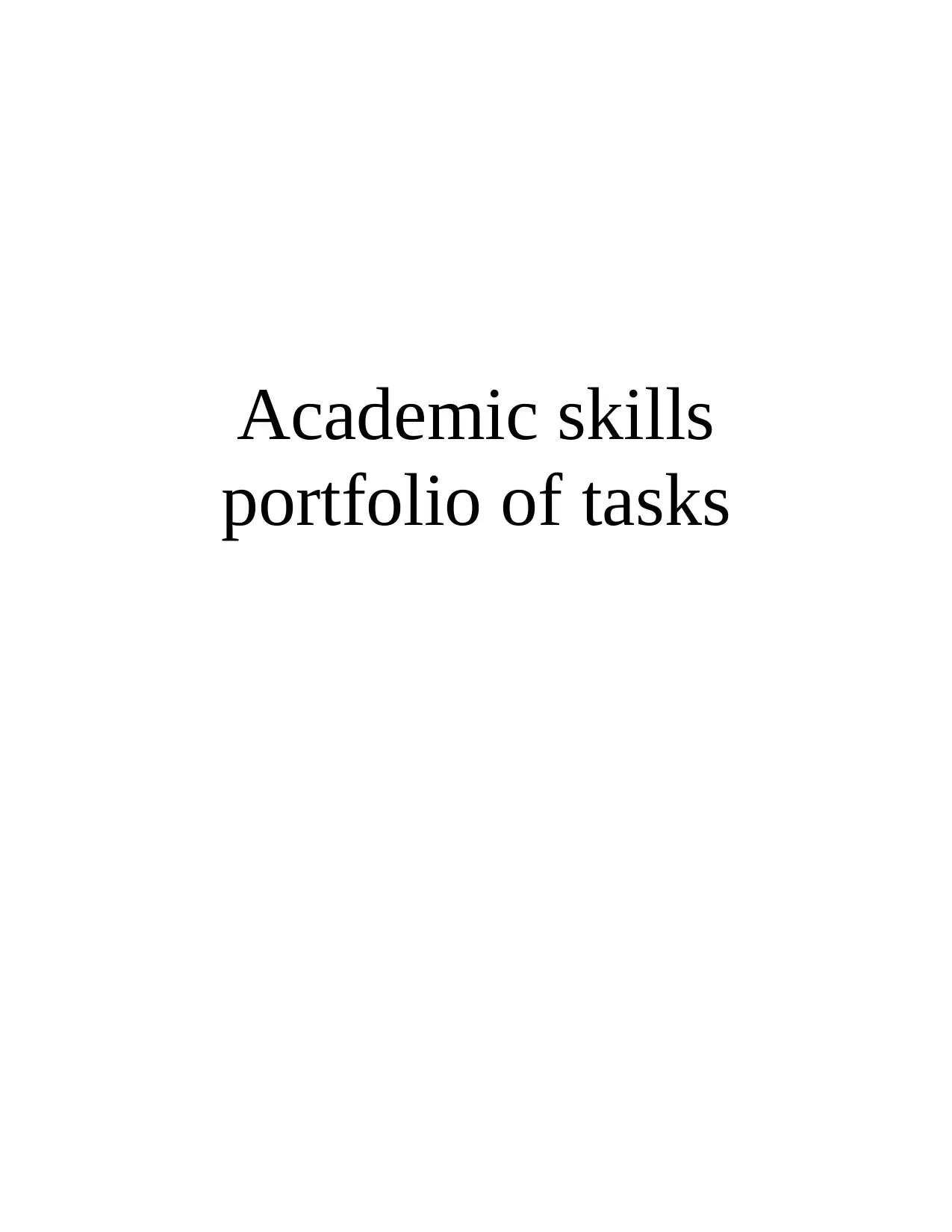
Academic skills
portfolio of tasks
portfolio of tasks
Secure Best Marks with AI Grader
Need help grading? Try our AI Grader for instant feedback on your assignments.
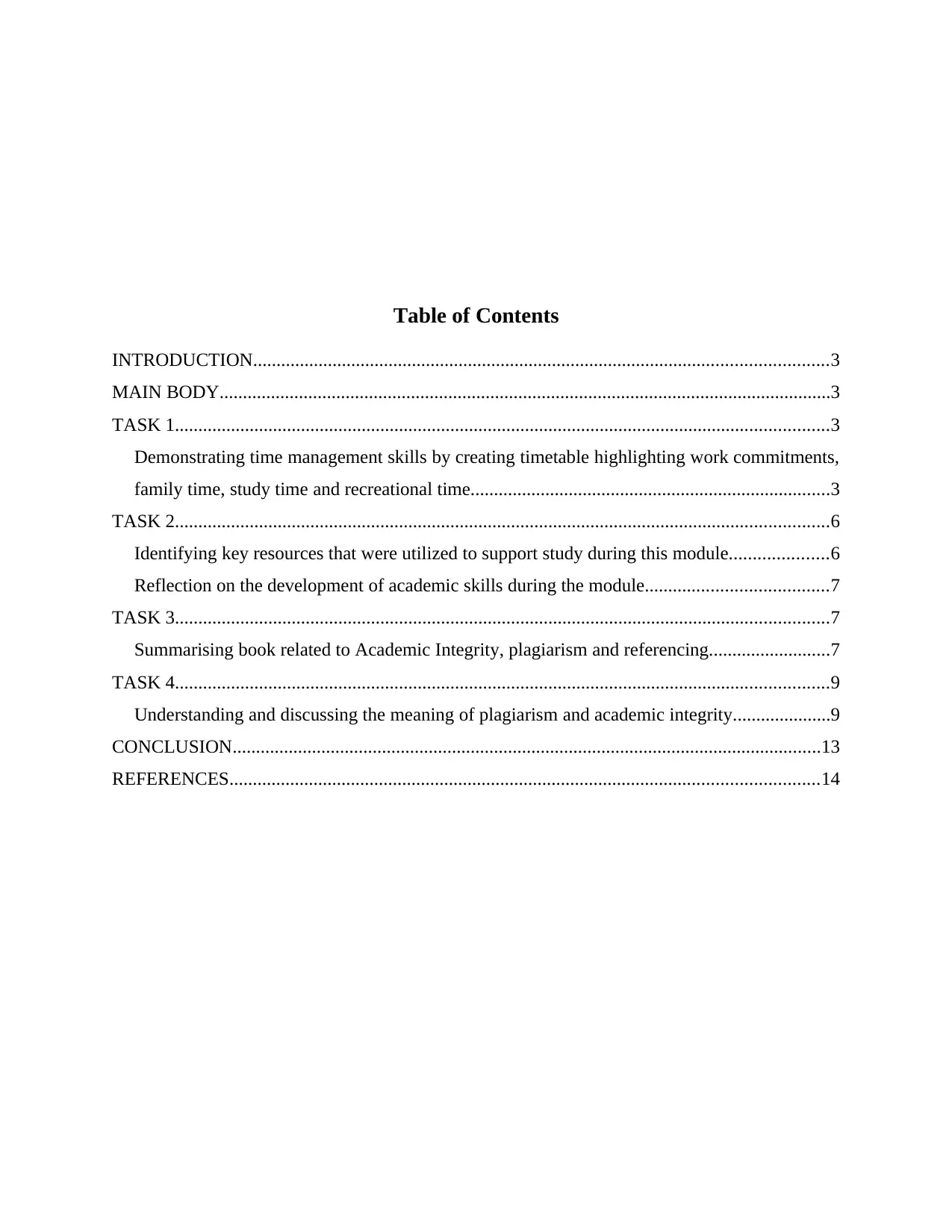
Table of Contents
INTRODUCTION...........................................................................................................................3
MAIN BODY...................................................................................................................................3
TASK 1............................................................................................................................................3
Demonstrating time management skills by creating timetable highlighting work commitments,
family time, study time and recreational time.............................................................................3
TASK 2............................................................................................................................................6
Identifying key resources that were utilized to support study during this module.....................6
Reflection on the development of academic skills during the module.......................................7
TASK 3............................................................................................................................................7
Summarising book related to Academic Integrity, plagiarism and referencing..........................7
TASK 4............................................................................................................................................9
Understanding and discussing the meaning of plagiarism and academic integrity.....................9
CONCLUSION..............................................................................................................................13
REFERENCES..............................................................................................................................14
INTRODUCTION...........................................................................................................................3
MAIN BODY...................................................................................................................................3
TASK 1............................................................................................................................................3
Demonstrating time management skills by creating timetable highlighting work commitments,
family time, study time and recreational time.............................................................................3
TASK 2............................................................................................................................................6
Identifying key resources that were utilized to support study during this module.....................6
Reflection on the development of academic skills during the module.......................................7
TASK 3............................................................................................................................................7
Summarising book related to Academic Integrity, plagiarism and referencing..........................7
TASK 4............................................................................................................................................9
Understanding and discussing the meaning of plagiarism and academic integrity.....................9
CONCLUSION..............................................................................................................................13
REFERENCES..............................................................................................................................14
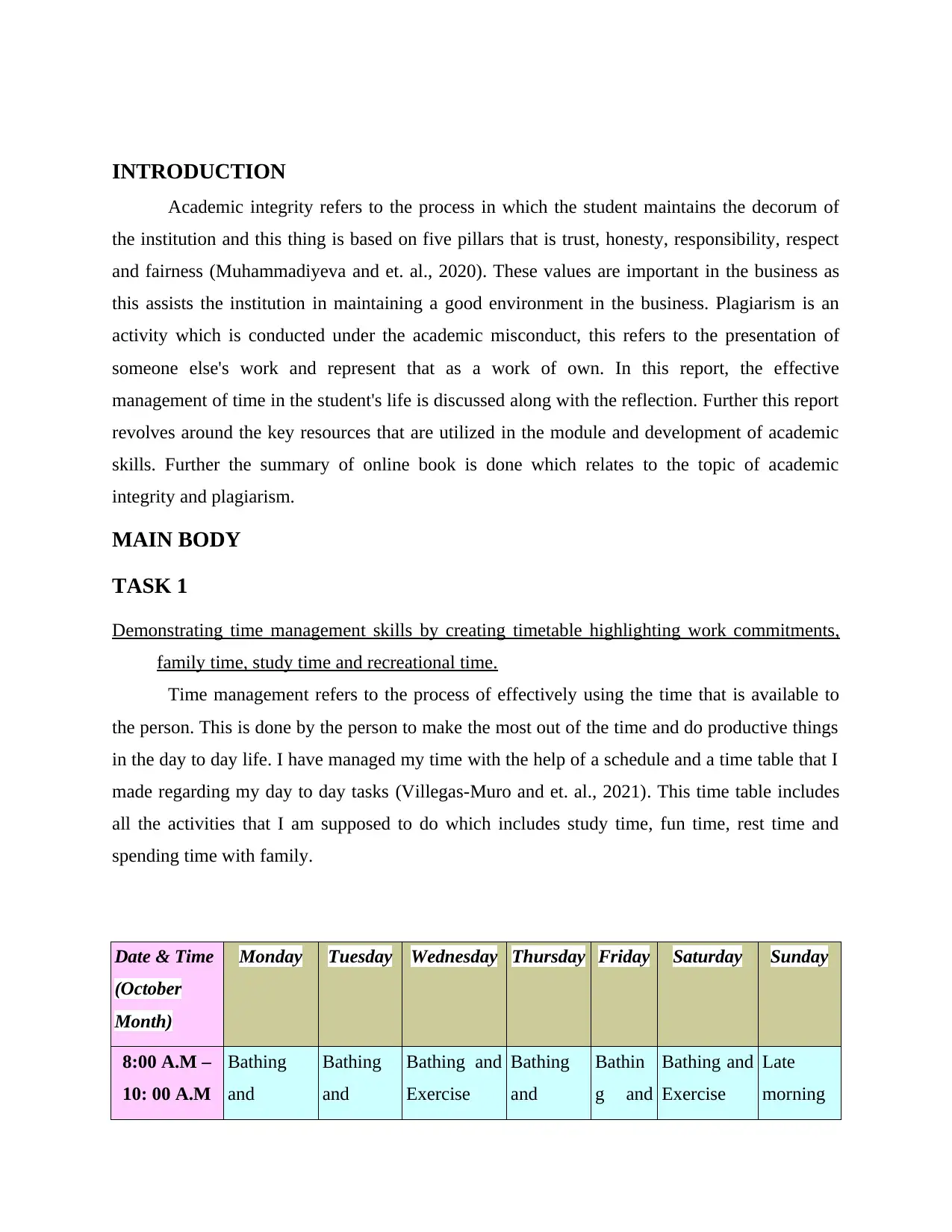
INTRODUCTION
Academic integrity refers to the process in which the student maintains the decorum of
the institution and this thing is based on five pillars that is trust, honesty, responsibility, respect
and fairness (Muhammadiyeva and et. al., 2020). These values are important in the business as
this assists the institution in maintaining a good environment in the business. Plagiarism is an
activity which is conducted under the academic misconduct, this refers to the presentation of
someone else's work and represent that as a work of own. In this report, the effective
management of time in the student's life is discussed along with the reflection. Further this report
revolves around the key resources that are utilized in the module and development of academic
skills. Further the summary of online book is done which relates to the topic of academic
integrity and plagiarism.
MAIN BODY
TASK 1
Demonstrating time management skills by creating timetable highlighting work commitments,
family time, study time and recreational time.
Time management refers to the process of effectively using the time that is available to
the person. This is done by the person to make the most out of the time and do productive things
in the day to day life. I have managed my time with the help of a schedule and a time table that I
made regarding my day to day tasks (Villegas-Muro and et. al., 2021). This time table includes
all the activities that I am supposed to do which includes study time, fun time, rest time and
spending time with family.
Date & Time
(October
Month)
Monday Tuesday Wednesday Thursday Friday Saturday Sunday
8:00 A.M –
10: 00 A.M
Bathing
and
Bathing
and
Bathing and
Exercise
Bathing
and
Bathin
g and
Bathing and
Exercise
Late
morning
Academic integrity refers to the process in which the student maintains the decorum of
the institution and this thing is based on five pillars that is trust, honesty, responsibility, respect
and fairness (Muhammadiyeva and et. al., 2020). These values are important in the business as
this assists the institution in maintaining a good environment in the business. Plagiarism is an
activity which is conducted under the academic misconduct, this refers to the presentation of
someone else's work and represent that as a work of own. In this report, the effective
management of time in the student's life is discussed along with the reflection. Further this report
revolves around the key resources that are utilized in the module and development of academic
skills. Further the summary of online book is done which relates to the topic of academic
integrity and plagiarism.
MAIN BODY
TASK 1
Demonstrating time management skills by creating timetable highlighting work commitments,
family time, study time and recreational time.
Time management refers to the process of effectively using the time that is available to
the person. This is done by the person to make the most out of the time and do productive things
in the day to day life. I have managed my time with the help of a schedule and a time table that I
made regarding my day to day tasks (Villegas-Muro and et. al., 2021). This time table includes
all the activities that I am supposed to do which includes study time, fun time, rest time and
spending time with family.
Date & Time
(October
Month)
Monday Tuesday Wednesday Thursday Friday Saturday Sunday
8:00 A.M –
10: 00 A.M
Bathing
and
Bathing
and
Bathing and
Exercise
Bathing
and
Bathin
g and
Bathing and
Exercise
Late
morning
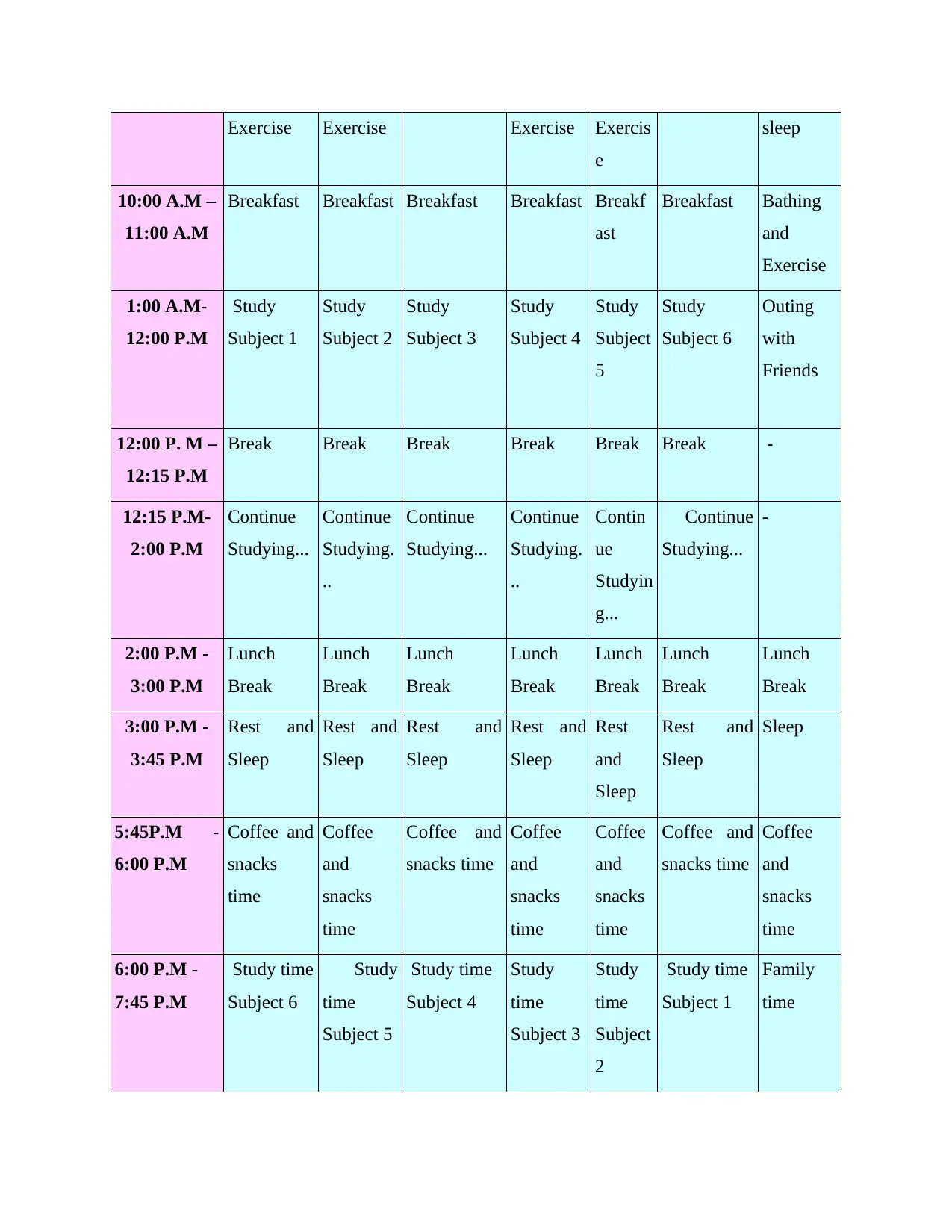
Exercise Exercise Exercise Exercis
e
sleep
10:00 A.M –
11:00 A.M
Breakfast Breakfast Breakfast Breakfast Breakf
ast
Breakfast Bathing
and
Exercise
1:00 A.M-
12:00 P.M
Study
Subject 1
Study
Subject 2
Study
Subject 3
Study
Subject 4
Study
Subject
5
Study
Subject 6
Outing
with
Friends
12:00 P. M –
12:15 P.M
Break Break Break Break Break Break -
12:15 P.M-
2:00 P.M
Continue
Studying...
Continue
Studying.
..
Continue
Studying...
Continue
Studying.
..
Contin
ue
Studyin
g...
Continue
Studying...
-
2:00 P.M -
3:00 P.M
Lunch
Break
Lunch
Break
Lunch
Break
Lunch
Break
Lunch
Break
Lunch
Break
Lunch
Break
3:00 P.M -
3:45 P.M
Rest and
Sleep
Rest and
Sleep
Rest and
Sleep
Rest and
Sleep
Rest
and
Sleep
Rest and
Sleep
Sleep
5:45P.M -
6:00 P.M
Coffee and
snacks
time
Coffee
and
snacks
time
Coffee and
snacks time
Coffee
and
snacks
time
Coffee
and
snacks
time
Coffee and
snacks time
Coffee
and
snacks
time
6:00 P.M -
7:45 P.M
Study time
Subject 6
Study
time
Subject 5
Study time
Subject 4
Study
time
Subject 3
Study
time
Subject
2
Study time
Subject 1
Family
time
e
sleep
10:00 A.M –
11:00 A.M
Breakfast Breakfast Breakfast Breakfast Breakf
ast
Breakfast Bathing
and
Exercise
1:00 A.M-
12:00 P.M
Study
Subject 1
Study
Subject 2
Study
Subject 3
Study
Subject 4
Study
Subject
5
Study
Subject 6
Outing
with
Friends
12:00 P. M –
12:15 P.M
Break Break Break Break Break Break -
12:15 P.M-
2:00 P.M
Continue
Studying...
Continue
Studying.
..
Continue
Studying...
Continue
Studying.
..
Contin
ue
Studyin
g...
Continue
Studying...
-
2:00 P.M -
3:00 P.M
Lunch
Break
Lunch
Break
Lunch
Break
Lunch
Break
Lunch
Break
Lunch
Break
Lunch
Break
3:00 P.M -
3:45 P.M
Rest and
Sleep
Rest and
Sleep
Rest and
Sleep
Rest and
Sleep
Rest
and
Sleep
Rest and
Sleep
Sleep
5:45P.M -
6:00 P.M
Coffee and
snacks
time
Coffee
and
snacks
time
Coffee and
snacks time
Coffee
and
snacks
time
Coffee
and
snacks
time
Coffee and
snacks time
Coffee
and
snacks
time
6:00 P.M -
7:45 P.M
Study time
Subject 6
Study
time
Subject 5
Study time
Subject 4
Study
time
Subject 3
Study
time
Subject
2
Study time
Subject 1
Family
time
Secure Best Marks with AI Grader
Need help grading? Try our AI Grader for instant feedback on your assignments.
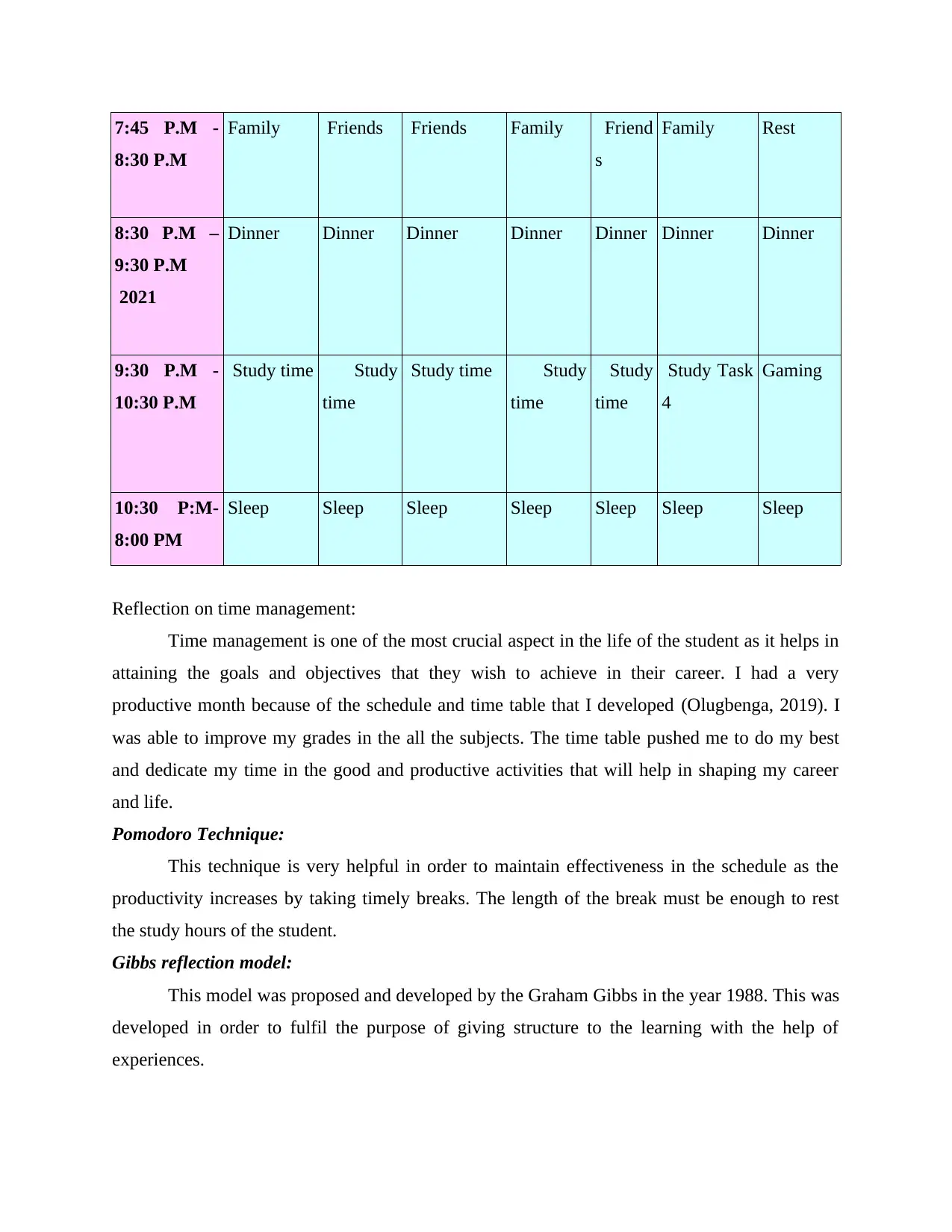
7:45 P.M -
8:30 P.M
Family Friends Friends Family Friend
s
Family Rest
8:30 P.M –
9:30 P.M
2021
Dinner Dinner Dinner Dinner Dinner Dinner Dinner
9:30 P.M -
10:30 P.M
Study time Study
time
Study time Study
time
Study
time
Study Task
4
Gaming
10:30 P:M-
8:00 PM
Sleep Sleep Sleep Sleep Sleep Sleep Sleep
Reflection on time management:
Time management is one of the most crucial aspect in the life of the student as it helps in
attaining the goals and objectives that they wish to achieve in their career. I had a very
productive month because of the schedule and time table that I developed (Olugbenga, 2019). I
was able to improve my grades in the all the subjects. The time table pushed me to do my best
and dedicate my time in the good and productive activities that will help in shaping my career
and life.
Pomodoro Technique:
This technique is very helpful in order to maintain effectiveness in the schedule as the
productivity increases by taking timely breaks. The length of the break must be enough to rest
the study hours of the student.
Gibbs reflection model:
This model was proposed and developed by the Graham Gibbs in the year 1988. This was
developed in order to fulfil the purpose of giving structure to the learning with the help of
experiences.
8:30 P.M
Family Friends Friends Family Friend
s
Family Rest
8:30 P.M –
9:30 P.M
2021
Dinner Dinner Dinner Dinner Dinner Dinner Dinner
9:30 P.M -
10:30 P.M
Study time Study
time
Study time Study
time
Study
time
Study Task
4
Gaming
10:30 P:M-
8:00 PM
Sleep Sleep Sleep Sleep Sleep Sleep Sleep
Reflection on time management:
Time management is one of the most crucial aspect in the life of the student as it helps in
attaining the goals and objectives that they wish to achieve in their career. I had a very
productive month because of the schedule and time table that I developed (Olugbenga, 2019). I
was able to improve my grades in the all the subjects. The time table pushed me to do my best
and dedicate my time in the good and productive activities that will help in shaping my career
and life.
Pomodoro Technique:
This technique is very helpful in order to maintain effectiveness in the schedule as the
productivity increases by taking timely breaks. The length of the break must be enough to rest
the study hours of the student.
Gibbs reflection model:
This model was proposed and developed by the Graham Gibbs in the year 1988. This was
developed in order to fulfil the purpose of giving structure to the learning with the help of
experiences.
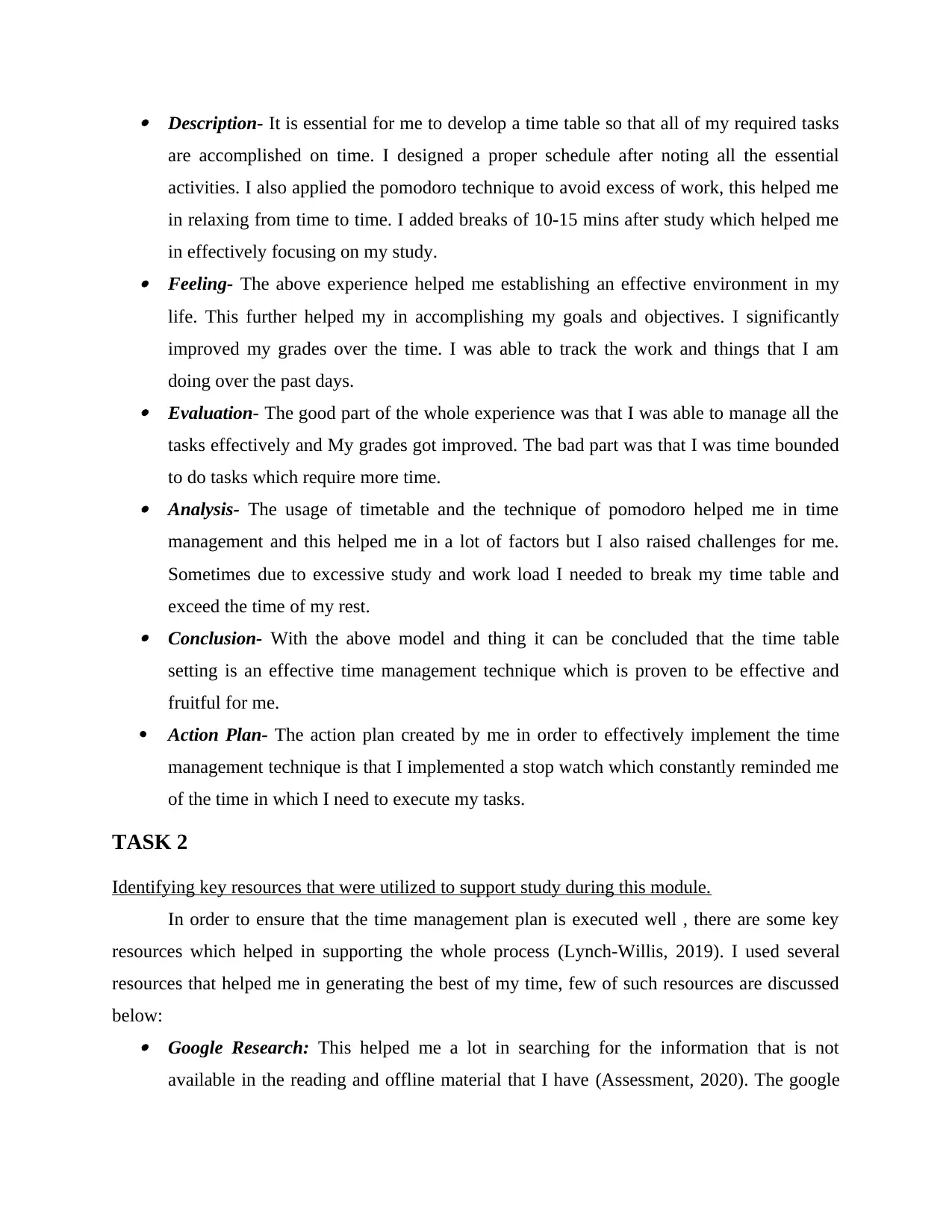
Description- It is essential for me to develop a time table so that all of my required tasks
are accomplished on time. I designed a proper schedule after noting all the essential
activities. I also applied the pomodoro technique to avoid excess of work, this helped me
in relaxing from time to time. I added breaks of 10-15 mins after study which helped me
in effectively focusing on my study. Feeling- The above experience helped me establishing an effective environment in my
life. This further helped my in accomplishing my goals and objectives. I significantly
improved my grades over the time. I was able to track the work and things that I am
doing over the past days. Evaluation- The good part of the whole experience was that I was able to manage all the
tasks effectively and My grades got improved. The bad part was that I was time bounded
to do tasks which require more time. Analysis- The usage of timetable and the technique of pomodoro helped me in time
management and this helped me in a lot of factors but I also raised challenges for me.
Sometimes due to excessive study and work load I needed to break my time table and
exceed the time of my rest. Conclusion- With the above model and thing it can be concluded that the time table
setting is an effective time management technique which is proven to be effective and
fruitful for me.
Action Plan- The action plan created by me in order to effectively implement the time
management technique is that I implemented a stop watch which constantly reminded me
of the time in which I need to execute my tasks.
TASK 2
Identifying key resources that were utilized to support study during this module.
In order to ensure that the time management plan is executed well , there are some key
resources which helped in supporting the whole process (Lynch-Willis, 2019). I used several
resources that helped me in generating the best of my time, few of such resources are discussed
below: Google Research: This helped me a lot in searching for the information that is not
available in the reading and offline material that I have (Assessment, 2020). The google
are accomplished on time. I designed a proper schedule after noting all the essential
activities. I also applied the pomodoro technique to avoid excess of work, this helped me
in relaxing from time to time. I added breaks of 10-15 mins after study which helped me
in effectively focusing on my study. Feeling- The above experience helped me establishing an effective environment in my
life. This further helped my in accomplishing my goals and objectives. I significantly
improved my grades over the time. I was able to track the work and things that I am
doing over the past days. Evaluation- The good part of the whole experience was that I was able to manage all the
tasks effectively and My grades got improved. The bad part was that I was time bounded
to do tasks which require more time. Analysis- The usage of timetable and the technique of pomodoro helped me in time
management and this helped me in a lot of factors but I also raised challenges for me.
Sometimes due to excessive study and work load I needed to break my time table and
exceed the time of my rest. Conclusion- With the above model and thing it can be concluded that the time table
setting is an effective time management technique which is proven to be effective and
fruitful for me.
Action Plan- The action plan created by me in order to effectively implement the time
management technique is that I implemented a stop watch which constantly reminded me
of the time in which I need to execute my tasks.
TASK 2
Identifying key resources that were utilized to support study during this module.
In order to ensure that the time management plan is executed well , there are some key
resources which helped in supporting the whole process (Lynch-Willis, 2019). I used several
resources that helped me in generating the best of my time, few of such resources are discussed
below: Google Research: This helped me a lot in searching for the information that is not
available in the reading and offline material that I have (Assessment, 2020). The google
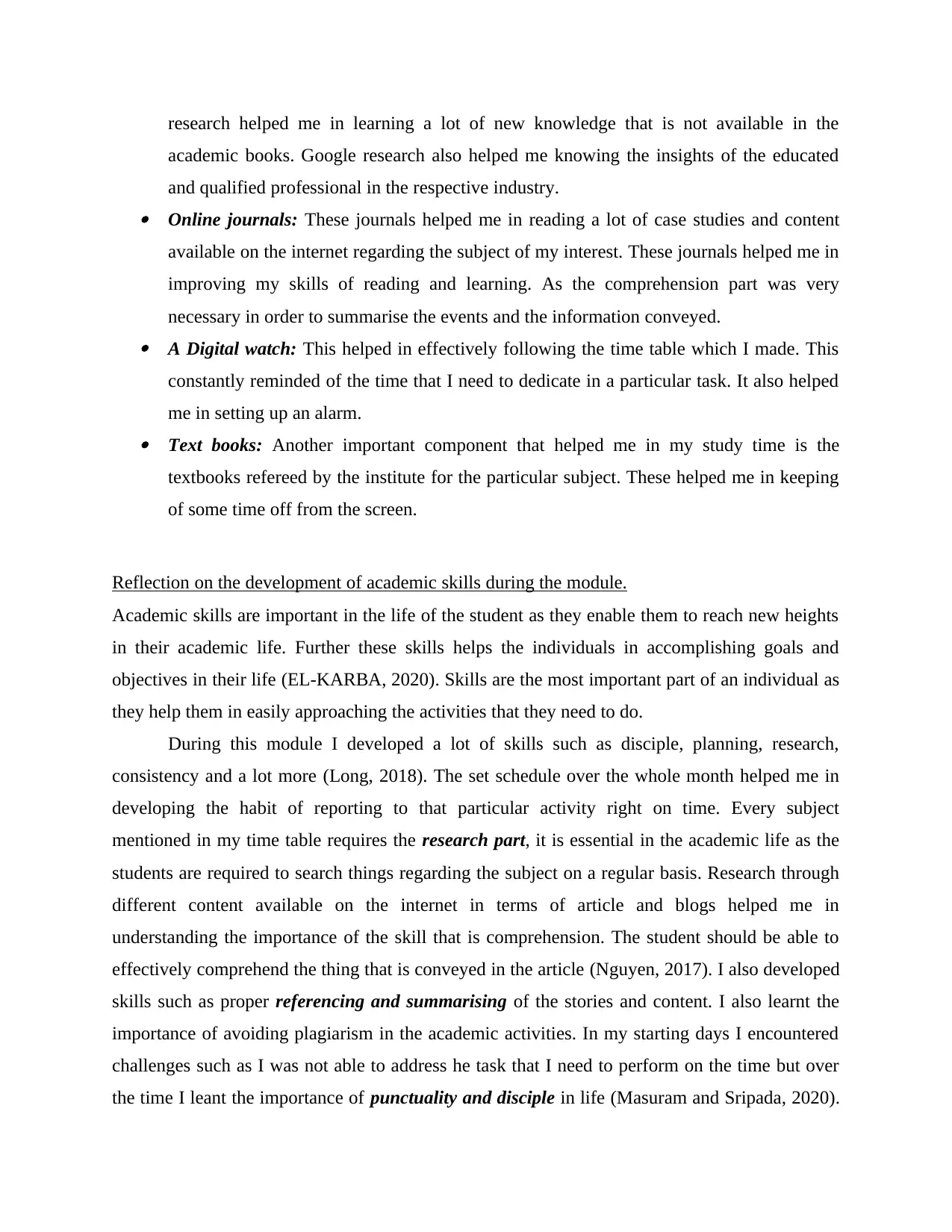
research helped me in learning a lot of new knowledge that is not available in the
academic books. Google research also helped me knowing the insights of the educated
and qualified professional in the respective industry. Online journals: These journals helped me in reading a lot of case studies and content
available on the internet regarding the subject of my interest. These journals helped me in
improving my skills of reading and learning. As the comprehension part was very
necessary in order to summarise the events and the information conveyed. A Digital watch: This helped in effectively following the time table which I made. This
constantly reminded of the time that I need to dedicate in a particular task. It also helped
me in setting up an alarm. Text books: Another important component that helped me in my study time is the
textbooks refereed by the institute for the particular subject. These helped me in keeping
of some time off from the screen.
Reflection on the development of academic skills during the module.
Academic skills are important in the life of the student as they enable them to reach new heights
in their academic life. Further these skills helps the individuals in accomplishing goals and
objectives in their life (EL-KARBA, 2020). Skills are the most important part of an individual as
they help them in easily approaching the activities that they need to do.
During this module I developed a lot of skills such as disciple, planning, research,
consistency and a lot more (Long, 2018). The set schedule over the whole month helped me in
developing the habit of reporting to that particular activity right on time. Every subject
mentioned in my time table requires the research part, it is essential in the academic life as the
students are required to search things regarding the subject on a regular basis. Research through
different content available on the internet in terms of article and blogs helped me in
understanding the importance of the skill that is comprehension. The student should be able to
effectively comprehend the thing that is conveyed in the article (Nguyen, 2017). I also developed
skills such as proper referencing and summarising of the stories and content. I also learnt the
importance of avoiding plagiarism in the academic activities. In my starting days I encountered
challenges such as I was not able to address he task that I need to perform on the time but over
the time I leant the importance of punctuality and disciple in life (Masuram and Sripada, 2020).
academic books. Google research also helped me knowing the insights of the educated
and qualified professional in the respective industry. Online journals: These journals helped me in reading a lot of case studies and content
available on the internet regarding the subject of my interest. These journals helped me in
improving my skills of reading and learning. As the comprehension part was very
necessary in order to summarise the events and the information conveyed. A Digital watch: This helped in effectively following the time table which I made. This
constantly reminded of the time that I need to dedicate in a particular task. It also helped
me in setting up an alarm. Text books: Another important component that helped me in my study time is the
textbooks refereed by the institute for the particular subject. These helped me in keeping
of some time off from the screen.
Reflection on the development of academic skills during the module.
Academic skills are important in the life of the student as they enable them to reach new heights
in their academic life. Further these skills helps the individuals in accomplishing goals and
objectives in their life (EL-KARBA, 2020). Skills are the most important part of an individual as
they help them in easily approaching the activities that they need to do.
During this module I developed a lot of skills such as disciple, planning, research,
consistency and a lot more (Long, 2018). The set schedule over the whole month helped me in
developing the habit of reporting to that particular activity right on time. Every subject
mentioned in my time table requires the research part, it is essential in the academic life as the
students are required to search things regarding the subject on a regular basis. Research through
different content available on the internet in terms of article and blogs helped me in
understanding the importance of the skill that is comprehension. The student should be able to
effectively comprehend the thing that is conveyed in the article (Nguyen, 2017). I also developed
skills such as proper referencing and summarising of the stories and content. I also learnt the
importance of avoiding plagiarism in the academic activities. In my starting days I encountered
challenges such as I was not able to address he task that I need to perform on the time but over
the time I leant the importance of punctuality and disciple in life (Masuram and Sripada, 2020).
Paraphrase This Document
Need a fresh take? Get an instant paraphrase of this document with our AI Paraphraser
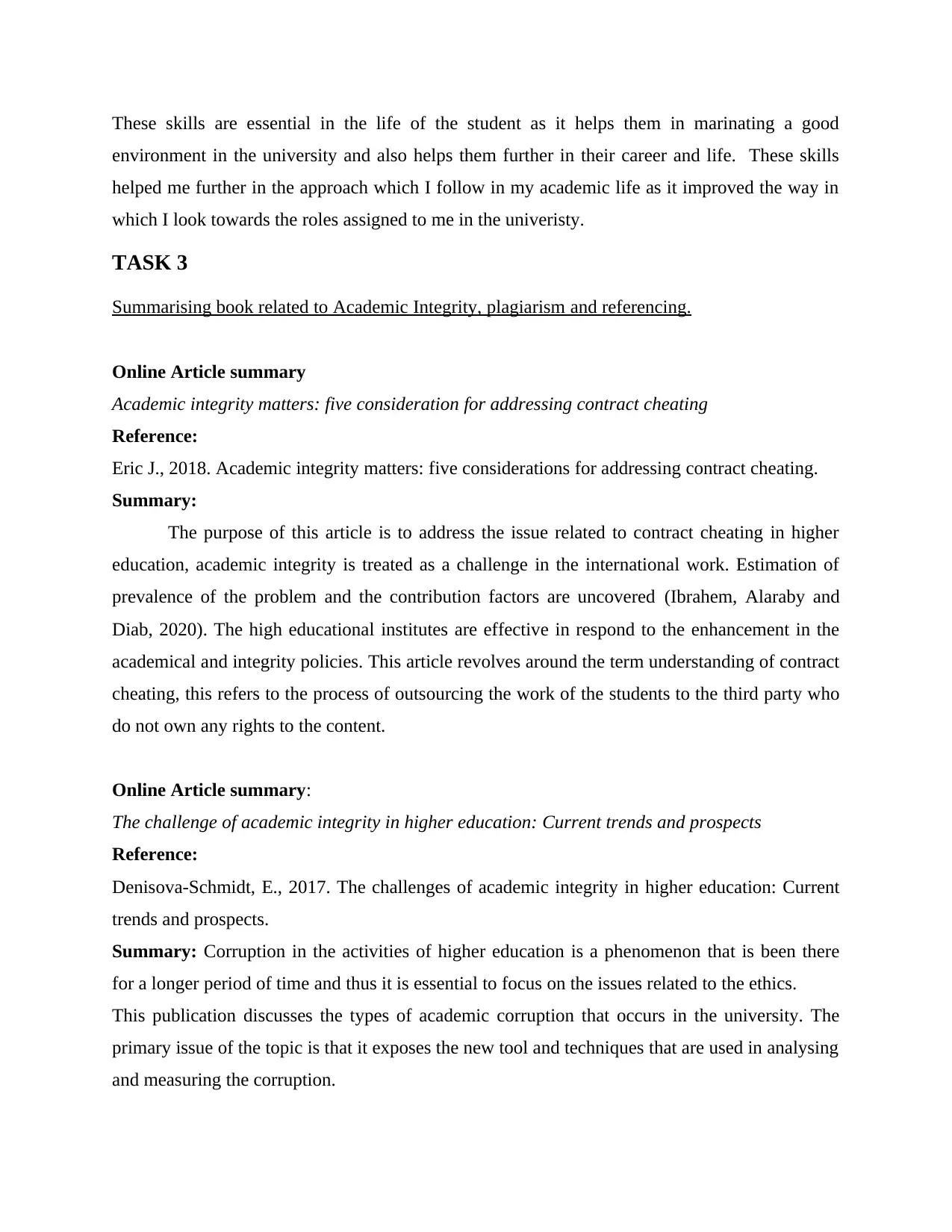
These skills are essential in the life of the student as it helps them in marinating a good
environment in the university and also helps them further in their career and life. These skills
helped me further in the approach which I follow in my academic life as it improved the way in
which I look towards the roles assigned to me in the univeristy.
TASK 3
Summarising book related to Academic Integrity, plagiarism and referencing.
Online Article summary
Academic integrity matters: five consideration for addressing contract cheating
Reference:
Eric J., 2018. Academic integrity matters: five considerations for addressing contract cheating.
Summary:
The purpose of this article is to address the issue related to contract cheating in higher
education, academic integrity is treated as a challenge in the international work. Estimation of
prevalence of the problem and the contribution factors are uncovered (Ibrahem, Alaraby and
Diab, 2020). The high educational institutes are effective in respond to the enhancement in the
academical and integrity policies. This article revolves around the term understanding of contract
cheating, this refers to the process of outsourcing the work of the students to the third party who
do not own any rights to the content.
Online Article summary:
The challenge of academic integrity in higher education: Current trends and prospects
Reference:
Denisova-Schmidt, E., 2017. The challenges of academic integrity in higher education: Current
trends and prospects.
Summary: Corruption in the activities of higher education is a phenomenon that is been there
for a longer period of time and thus it is essential to focus on the issues related to the ethics.
This publication discusses the types of academic corruption that occurs in the university. The
primary issue of the topic is that it exposes the new tool and techniques that are used in analysing
and measuring the corruption.
environment in the university and also helps them further in their career and life. These skills
helped me further in the approach which I follow in my academic life as it improved the way in
which I look towards the roles assigned to me in the univeristy.
TASK 3
Summarising book related to Academic Integrity, plagiarism and referencing.
Online Article summary
Academic integrity matters: five consideration for addressing contract cheating
Reference:
Eric J., 2018. Academic integrity matters: five considerations for addressing contract cheating.
Summary:
The purpose of this article is to address the issue related to contract cheating in higher
education, academic integrity is treated as a challenge in the international work. Estimation of
prevalence of the problem and the contribution factors are uncovered (Ibrahem, Alaraby and
Diab, 2020). The high educational institutes are effective in respond to the enhancement in the
academical and integrity policies. This article revolves around the term understanding of contract
cheating, this refers to the process of outsourcing the work of the students to the third party who
do not own any rights to the content.
Online Article summary:
The challenge of academic integrity in higher education: Current trends and prospects
Reference:
Denisova-Schmidt, E., 2017. The challenges of academic integrity in higher education: Current
trends and prospects.
Summary: Corruption in the activities of higher education is a phenomenon that is been there
for a longer period of time and thus it is essential to focus on the issues related to the ethics.
This publication discusses the types of academic corruption that occurs in the university. The
primary issue of the topic is that it exposes the new tool and techniques that are used in analysing
and measuring the corruption.
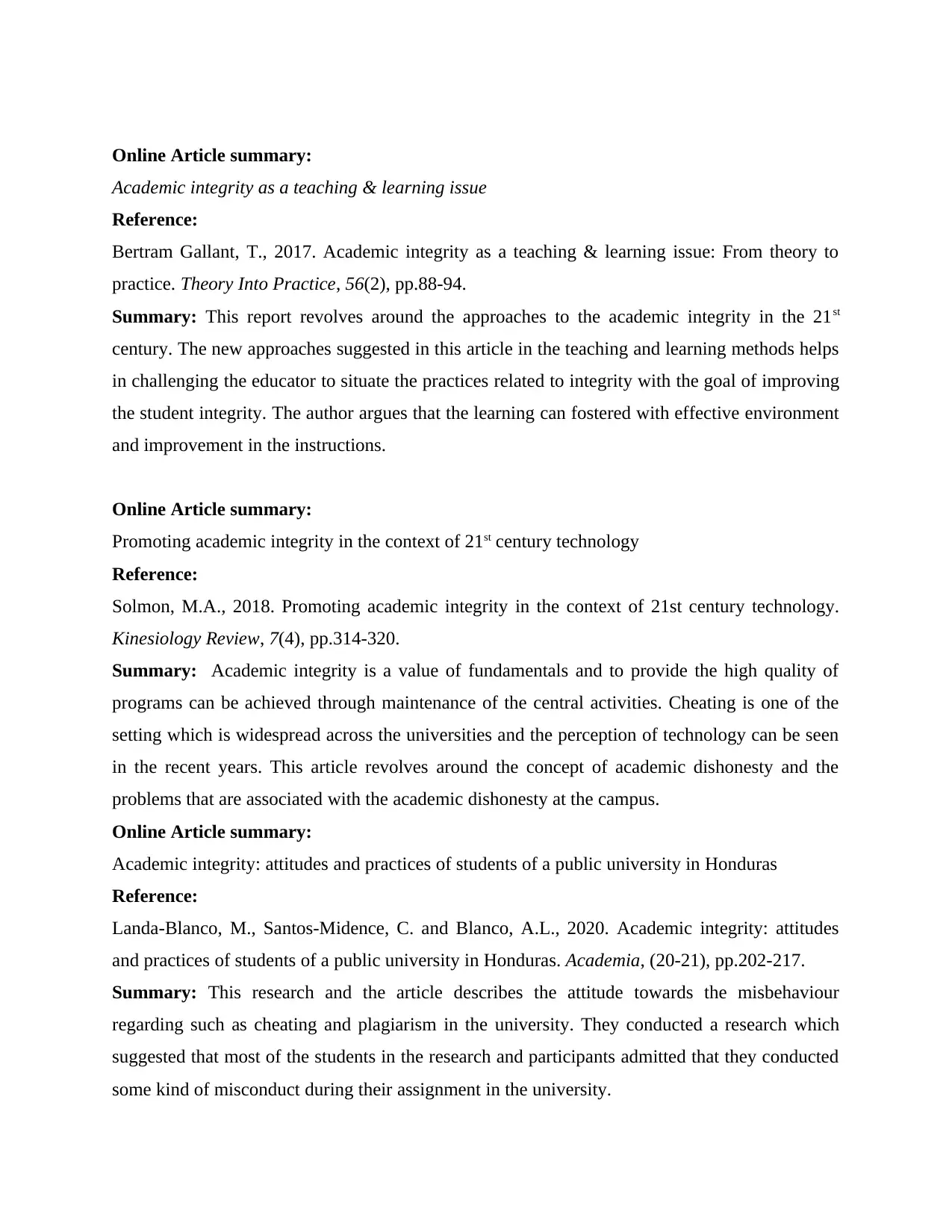
Online Article summary:
Academic integrity as a teaching & learning issue
Reference:
Bertram Gallant, T., 2017. Academic integrity as a teaching & learning issue: From theory to
practice. Theory Into Practice, 56(2), pp.88-94.
Summary: This report revolves around the approaches to the academic integrity in the 21st
century. The new approaches suggested in this article in the teaching and learning methods helps
in challenging the educator to situate the practices related to integrity with the goal of improving
the student integrity. The author argues that the learning can fostered with effective environment
and improvement in the instructions.
Online Article summary:
Promoting academic integrity in the context of 21st century technology
Reference:
Solmon, M.A., 2018. Promoting academic integrity in the context of 21st century technology.
Kinesiology Review, 7(4), pp.314-320.
Summary: Academic integrity is a value of fundamentals and to provide the high quality of
programs can be achieved through maintenance of the central activities. Cheating is one of the
setting which is widespread across the universities and the perception of technology can be seen
in the recent years. This article revolves around the concept of academic dishonesty and the
problems that are associated with the academic dishonesty at the campus.
Online Article summary:
Academic integrity: attitudes and practices of students of a public university in Honduras
Reference:
Landa-Blanco, M., Santos-Midence, C. and Blanco, A.L., 2020. Academic integrity: attitudes
and practices of students of a public university in Honduras. Academia, (20-21), pp.202-217.
Summary: This research and the article describes the attitude towards the misbehaviour
regarding such as cheating and plagiarism in the university. They conducted a research which
suggested that most of the students in the research and participants admitted that they conducted
some kind of misconduct during their assignment in the university.
Academic integrity as a teaching & learning issue
Reference:
Bertram Gallant, T., 2017. Academic integrity as a teaching & learning issue: From theory to
practice. Theory Into Practice, 56(2), pp.88-94.
Summary: This report revolves around the approaches to the academic integrity in the 21st
century. The new approaches suggested in this article in the teaching and learning methods helps
in challenging the educator to situate the practices related to integrity with the goal of improving
the student integrity. The author argues that the learning can fostered with effective environment
and improvement in the instructions.
Online Article summary:
Promoting academic integrity in the context of 21st century technology
Reference:
Solmon, M.A., 2018. Promoting academic integrity in the context of 21st century technology.
Kinesiology Review, 7(4), pp.314-320.
Summary: Academic integrity is a value of fundamentals and to provide the high quality of
programs can be achieved through maintenance of the central activities. Cheating is one of the
setting which is widespread across the universities and the perception of technology can be seen
in the recent years. This article revolves around the concept of academic dishonesty and the
problems that are associated with the academic dishonesty at the campus.
Online Article summary:
Academic integrity: attitudes and practices of students of a public university in Honduras
Reference:
Landa-Blanco, M., Santos-Midence, C. and Blanco, A.L., 2020. Academic integrity: attitudes
and practices of students of a public university in Honduras. Academia, (20-21), pp.202-217.
Summary: This research and the article describes the attitude towards the misbehaviour
regarding such as cheating and plagiarism in the university. They conducted a research which
suggested that most of the students in the research and participants admitted that they conducted
some kind of misconduct during their assignment in the university.
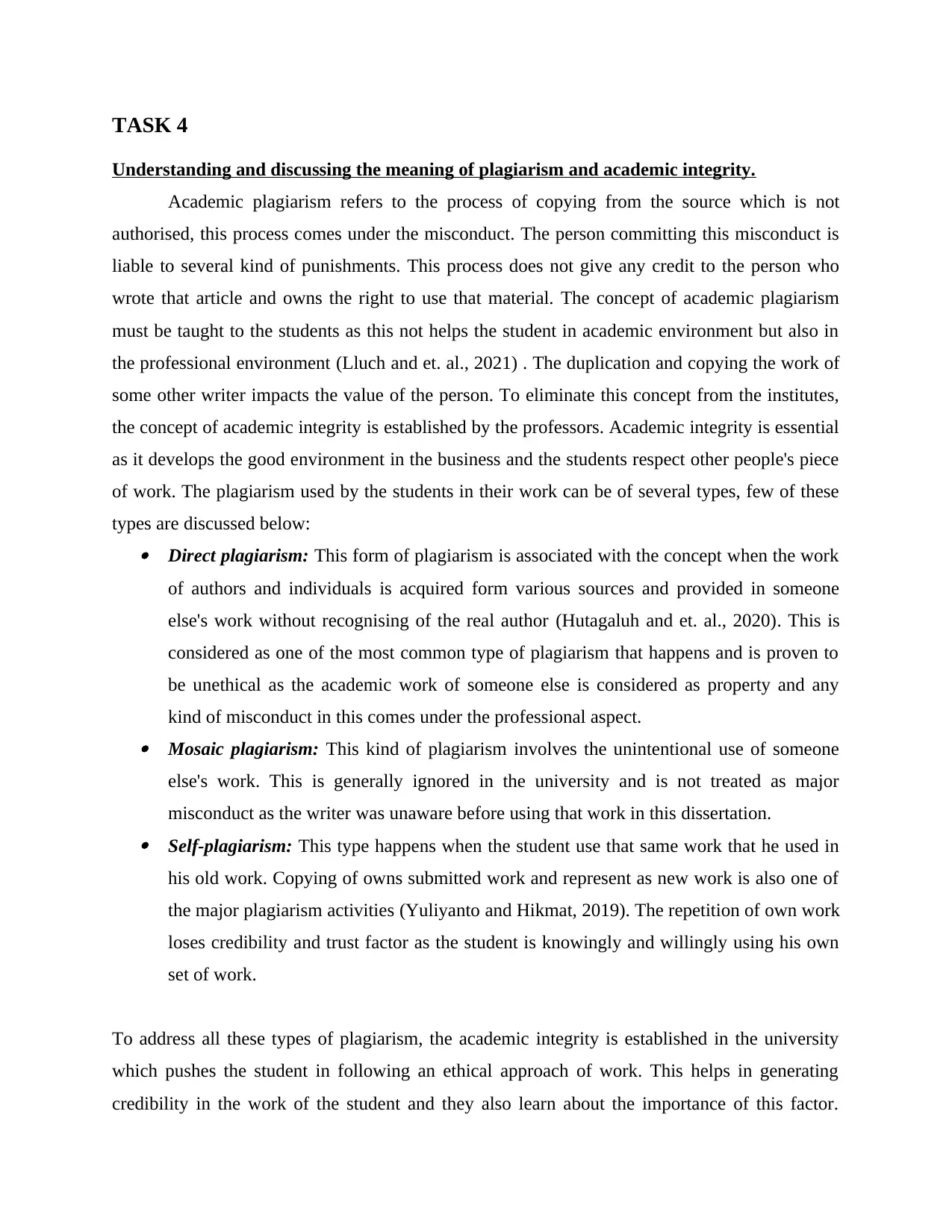
TASK 4
Understanding and discussing the meaning of plagiarism and academic integrity.
Academic plagiarism refers to the process of copying from the source which is not
authorised, this process comes under the misconduct. The person committing this misconduct is
liable to several kind of punishments. This process does not give any credit to the person who
wrote that article and owns the right to use that material. The concept of academic plagiarism
must be taught to the students as this not helps the student in academic environment but also in
the professional environment (Lluch and et. al., 2021) . The duplication and copying the work of
some other writer impacts the value of the person. To eliminate this concept from the institutes,
the concept of academic integrity is established by the professors. Academic integrity is essential
as it develops the good environment in the business and the students respect other people's piece
of work. The plagiarism used by the students in their work can be of several types, few of these
types are discussed below: Direct plagiarism: This form of plagiarism is associated with the concept when the work
of authors and individuals is acquired form various sources and provided in someone
else's work without recognising of the real author (Hutagaluh and et. al., 2020). This is
considered as one of the most common type of plagiarism that happens and is proven to
be unethical as the academic work of someone else is considered as property and any
kind of misconduct in this comes under the professional aspect. Mosaic plagiarism: This kind of plagiarism involves the unintentional use of someone
else's work. This is generally ignored in the university and is not treated as major
misconduct as the writer was unaware before using that work in this dissertation. Self-plagiarism: This type happens when the student use that same work that he used in
his old work. Copying of owns submitted work and represent as new work is also one of
the major plagiarism activities (Yuliyanto and Hikmat, 2019). The repetition of own work
loses credibility and trust factor as the student is knowingly and willingly using his own
set of work.
To address all these types of plagiarism, the academic integrity is established in the university
which pushes the student in following an ethical approach of work. This helps in generating
credibility in the work of the student and they also learn about the importance of this factor.
Understanding and discussing the meaning of plagiarism and academic integrity.
Academic plagiarism refers to the process of copying from the source which is not
authorised, this process comes under the misconduct. The person committing this misconduct is
liable to several kind of punishments. This process does not give any credit to the person who
wrote that article and owns the right to use that material. The concept of academic plagiarism
must be taught to the students as this not helps the student in academic environment but also in
the professional environment (Lluch and et. al., 2021) . The duplication and copying the work of
some other writer impacts the value of the person. To eliminate this concept from the institutes,
the concept of academic integrity is established by the professors. Academic integrity is essential
as it develops the good environment in the business and the students respect other people's piece
of work. The plagiarism used by the students in their work can be of several types, few of these
types are discussed below: Direct plagiarism: This form of plagiarism is associated with the concept when the work
of authors and individuals is acquired form various sources and provided in someone
else's work without recognising of the real author (Hutagaluh and et. al., 2020). This is
considered as one of the most common type of plagiarism that happens and is proven to
be unethical as the academic work of someone else is considered as property and any
kind of misconduct in this comes under the professional aspect. Mosaic plagiarism: This kind of plagiarism involves the unintentional use of someone
else's work. This is generally ignored in the university and is not treated as major
misconduct as the writer was unaware before using that work in this dissertation. Self-plagiarism: This type happens when the student use that same work that he used in
his old work. Copying of owns submitted work and represent as new work is also one of
the major plagiarism activities (Yuliyanto and Hikmat, 2019). The repetition of own work
loses credibility and trust factor as the student is knowingly and willingly using his own
set of work.
To address all these types of plagiarism, the academic integrity is established in the university
which pushes the student in following an ethical approach of work. This helps in generating
credibility in the work of the student and they also learn about the importance of this factor.
Secure Best Marks with AI Grader
Need help grading? Try our AI Grader for instant feedback on your assignments.
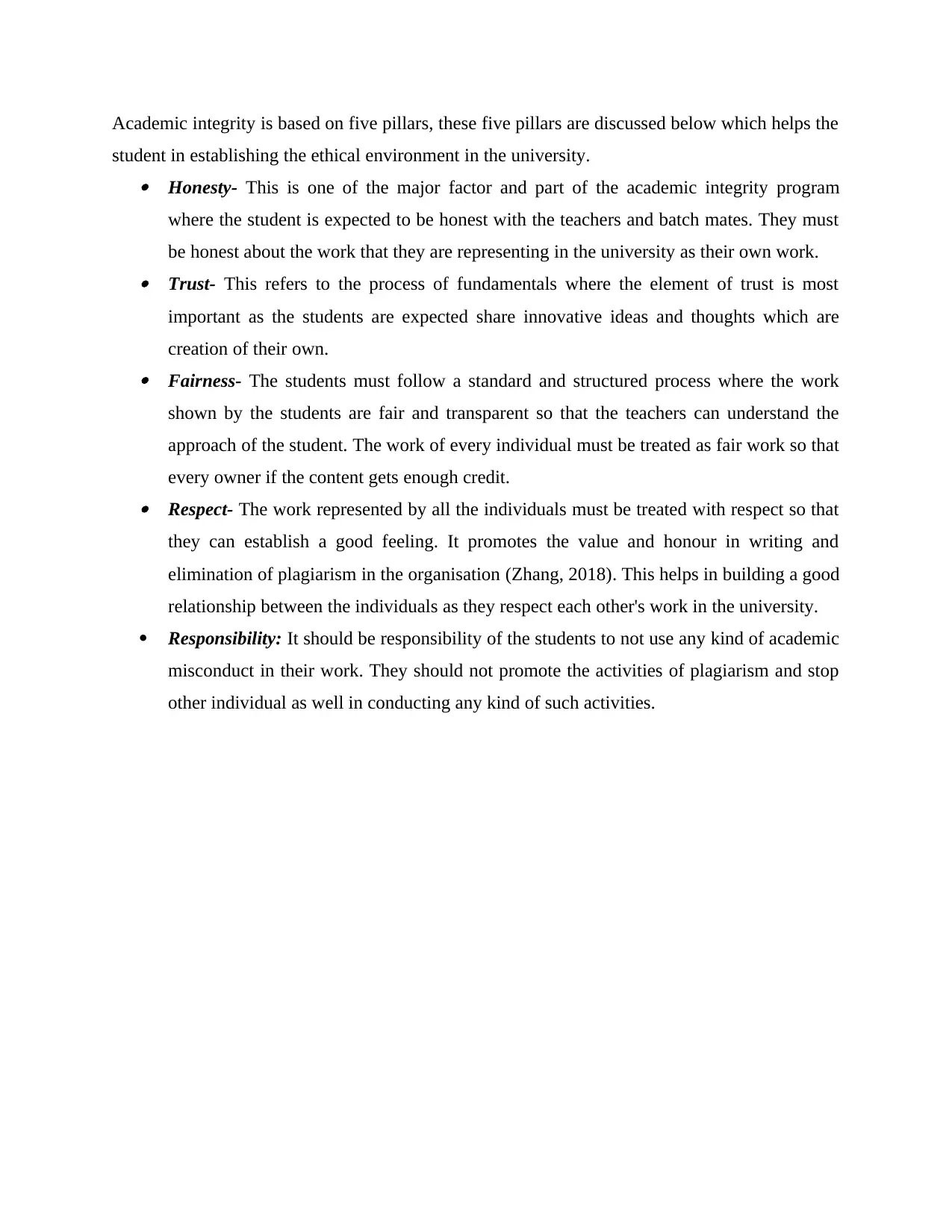
Academic integrity is based on five pillars, these five pillars are discussed below which helps the
student in establishing the ethical environment in the university. Honesty- This is one of the major factor and part of the academic integrity program
where the student is expected to be honest with the teachers and batch mates. They must
be honest about the work that they are representing in the university as their own work. Trust- This refers to the process of fundamentals where the element of trust is most
important as the students are expected share innovative ideas and thoughts which are
creation of their own. Fairness- The students must follow a standard and structured process where the work
shown by the students are fair and transparent so that the teachers can understand the
approach of the student. The work of every individual must be treated as fair work so that
every owner if the content gets enough credit. Respect- The work represented by all the individuals must be treated with respect so that
they can establish a good feeling. It promotes the value and honour in writing and
elimination of plagiarism in the organisation (Zhang, 2018). This helps in building a good
relationship between the individuals as they respect each other's work in the university.
Responsibility: It should be responsibility of the students to not use any kind of academic
misconduct in their work. They should not promote the activities of plagiarism and stop
other individual as well in conducting any kind of such activities.
student in establishing the ethical environment in the university. Honesty- This is one of the major factor and part of the academic integrity program
where the student is expected to be honest with the teachers and batch mates. They must
be honest about the work that they are representing in the university as their own work. Trust- This refers to the process of fundamentals where the element of trust is most
important as the students are expected share innovative ideas and thoughts which are
creation of their own. Fairness- The students must follow a standard and structured process where the work
shown by the students are fair and transparent so that the teachers can understand the
approach of the student. The work of every individual must be treated as fair work so that
every owner if the content gets enough credit. Respect- The work represented by all the individuals must be treated with respect so that
they can establish a good feeling. It promotes the value and honour in writing and
elimination of plagiarism in the organisation (Zhang, 2018). This helps in building a good
relationship between the individuals as they respect each other's work in the university.
Responsibility: It should be responsibility of the students to not use any kind of academic
misconduct in their work. They should not promote the activities of plagiarism and stop
other individual as well in conducting any kind of such activities.
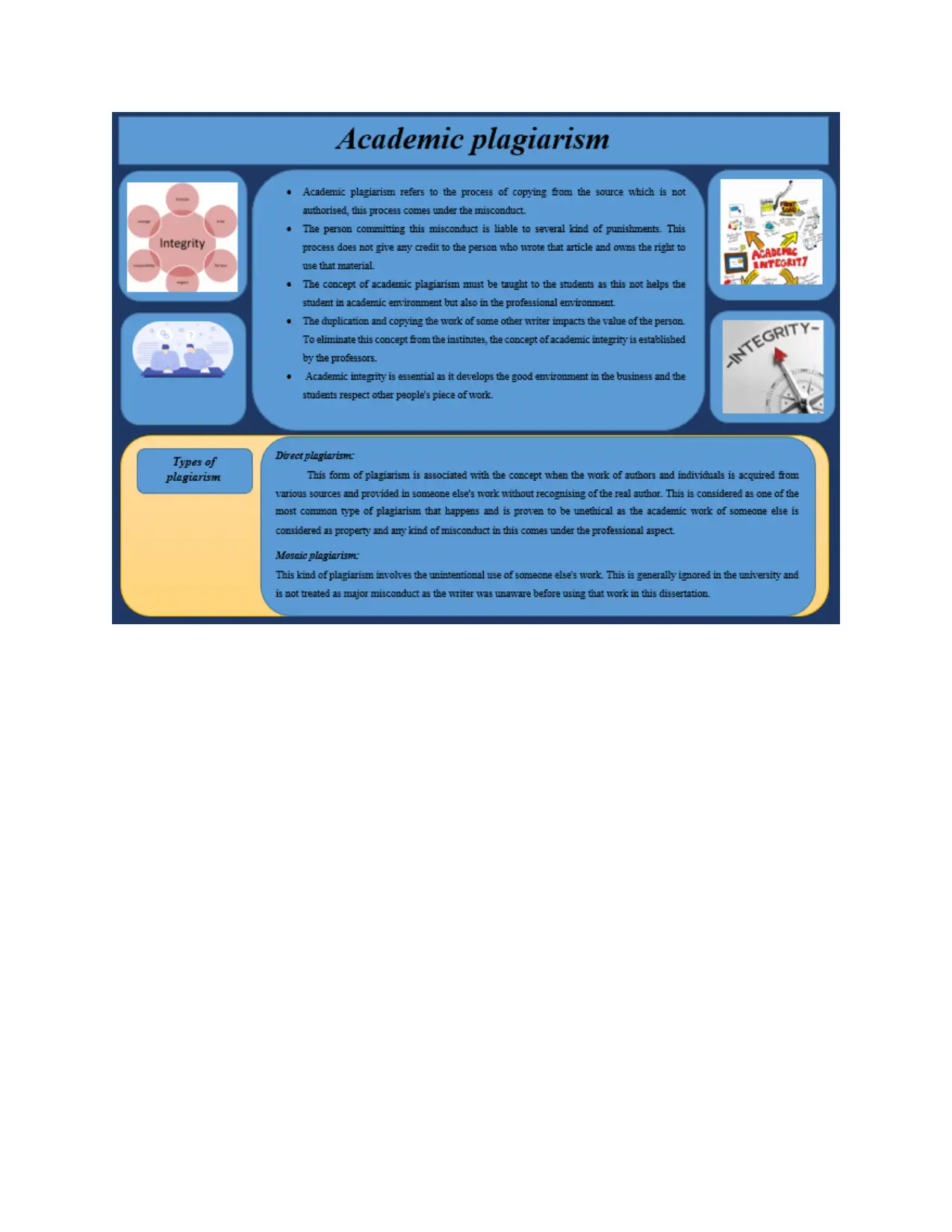
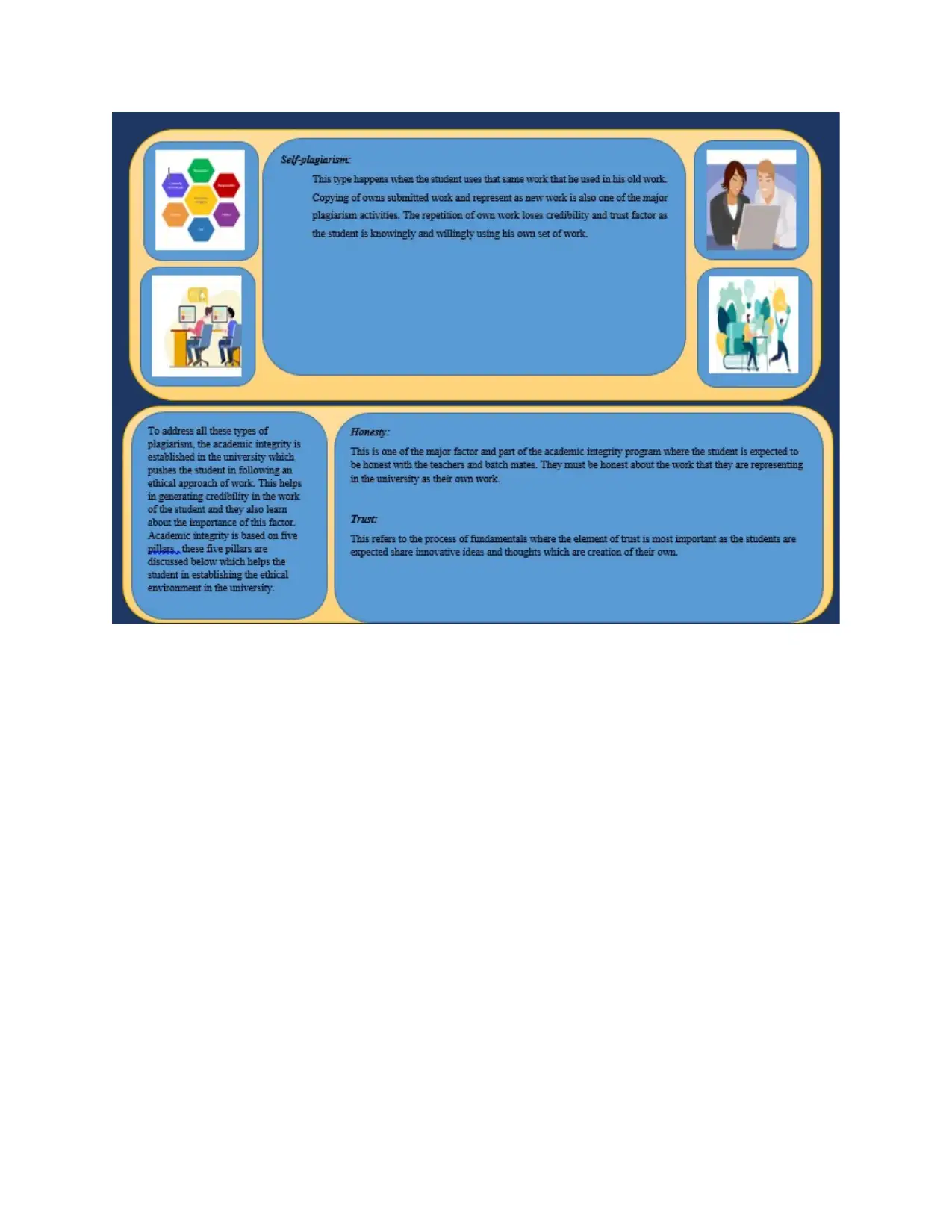
Paraphrase This Document
Need a fresh take? Get an instant paraphrase of this document with our AI Paraphraser
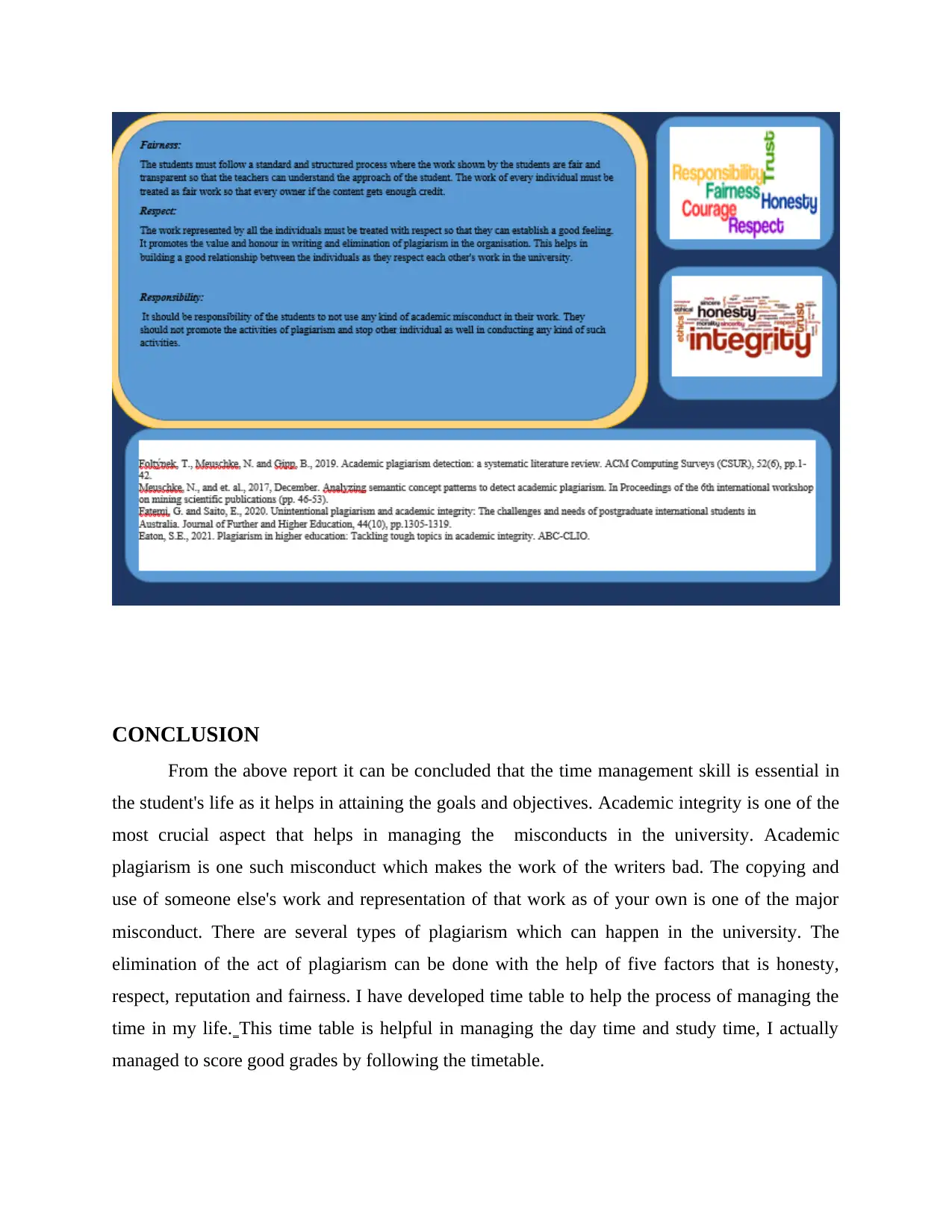
CONCLUSION
From the above report it can be concluded that the time management skill is essential in
the student's life as it helps in attaining the goals and objectives. Academic integrity is one of the
most crucial aspect that helps in managing the misconducts in the university. Academic
plagiarism is one such misconduct which makes the work of the writers bad. The copying and
use of someone else's work and representation of that work as of your own is one of the major
misconduct. There are several types of plagiarism which can happen in the university. The
elimination of the act of plagiarism can be done with the help of five factors that is honesty,
respect, reputation and fairness. I have developed time table to help the process of managing the
time in my life. This time table is helpful in managing the day time and study time, I actually
managed to score good grades by following the timetable.
From the above report it can be concluded that the time management skill is essential in
the student's life as it helps in attaining the goals and objectives. Academic integrity is one of the
most crucial aspect that helps in managing the misconducts in the university. Academic
plagiarism is one such misconduct which makes the work of the writers bad. The copying and
use of someone else's work and representation of that work as of your own is one of the major
misconduct. There are several types of plagiarism which can happen in the university. The
elimination of the act of plagiarism can be done with the help of five factors that is honesty,
respect, reputation and fairness. I have developed time table to help the process of managing the
time in my life. This time table is helpful in managing the day time and study time, I actually
managed to score good grades by following the timetable.
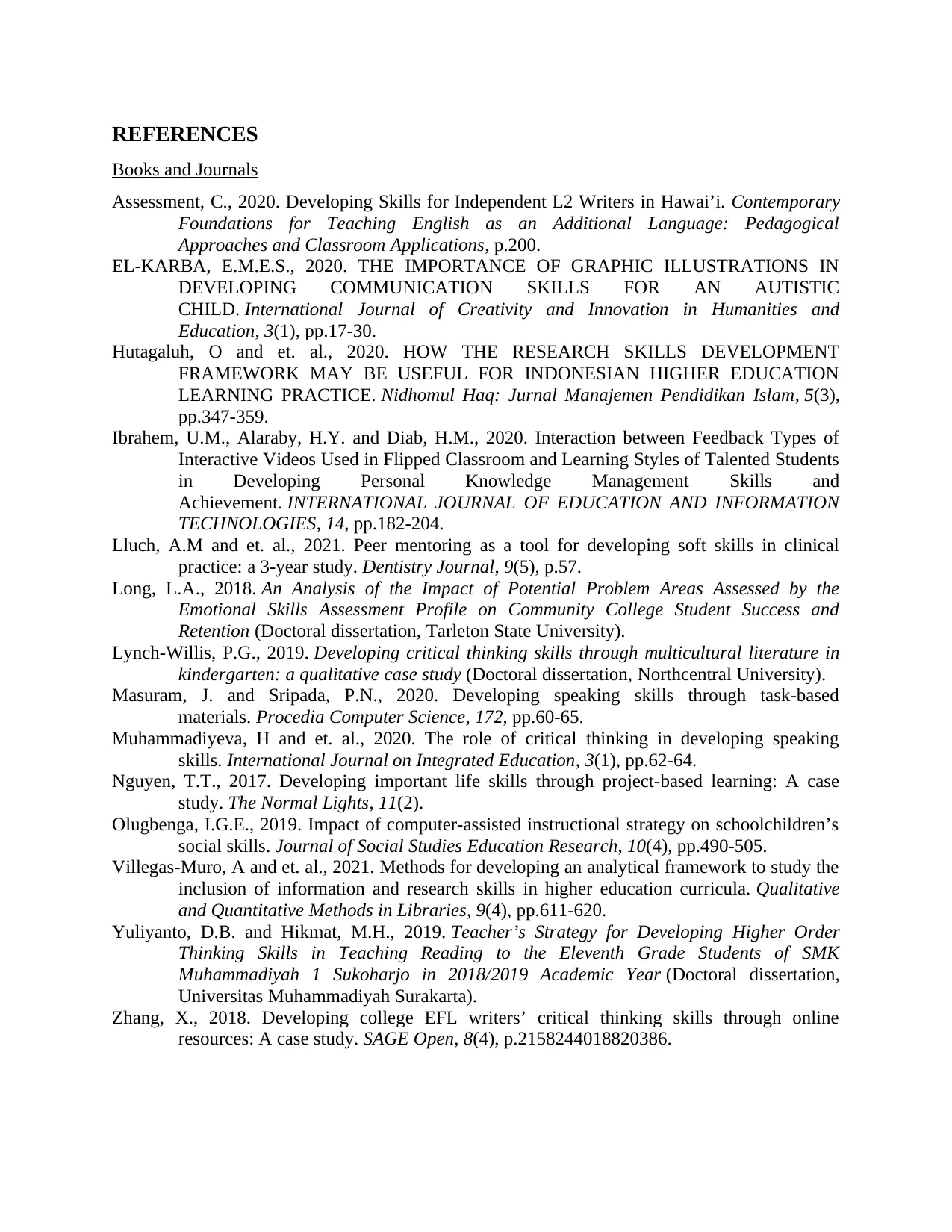
REFERENCES
Books and Journals
Assessment, C., 2020. Developing Skills for Independent L2 Writers in Hawai’i. Contemporary
Foundations for Teaching English as an Additional Language: Pedagogical
Approaches and Classroom Applications, p.200.
EL-KARBA, E.M.E.S., 2020. THE IMPORTANCE OF GRAPHIC ILLUSTRATIONS IN
DEVELOPING COMMUNICATION SKILLS FOR AN AUTISTIC
CHILD. International Journal of Creativity and Innovation in Humanities and
Education, 3(1), pp.17-30.
Hutagaluh, O and et. al., 2020. HOW THE RESEARCH SKILLS DEVELOPMENT
FRAMEWORK MAY BE USEFUL FOR INDONESIAN HIGHER EDUCATION
LEARNING PRACTICE. Nidhomul Haq: Jurnal Manajemen Pendidikan Islam, 5(3),
pp.347-359.
Ibrahem, U.M., Alaraby, H.Y. and Diab, H.M., 2020. Interaction between Feedback Types of
Interactive Videos Used in Flipped Classroom and Learning Styles of Talented Students
in Developing Personal Knowledge Management Skills and
Achievement. INTERNATIONAL JOURNAL OF EDUCATION AND INFORMATION
TECHNOLOGIES, 14, pp.182-204.
Lluch, A.M and et. al., 2021. Peer mentoring as a tool for developing soft skills in clinical
practice: a 3-year study. Dentistry Journal, 9(5), p.57.
Long, L.A., 2018. An Analysis of the Impact of Potential Problem Areas Assessed by the
Emotional Skills Assessment Profile on Community College Student Success and
Retention (Doctoral dissertation, Tarleton State University).
Lynch-Willis, P.G., 2019. Developing critical thinking skills through multicultural literature in
kindergarten: a qualitative case study (Doctoral dissertation, Northcentral University).
Masuram, J. and Sripada, P.N., 2020. Developing speaking skills through task-based
materials. Procedia Computer Science, 172, pp.60-65.
Muhammadiyeva, H and et. al., 2020. The role of critical thinking in developing speaking
skills. International Journal on Integrated Education, 3(1), pp.62-64.
Nguyen, T.T., 2017. Developing important life skills through project-based learning: A case
study. The Normal Lights, 11(2).
Olugbenga, I.G.E., 2019. Impact of computer-assisted instructional strategy on schoolchildren’s
social skills. Journal of Social Studies Education Research, 10(4), pp.490-505.
Villegas-Muro, A and et. al., 2021. Methods for developing an analytical framework to study the
inclusion of information and research skills in higher education curricula. Qualitative
and Quantitative Methods in Libraries, 9(4), pp.611-620.
Yuliyanto, D.B. and Hikmat, M.H., 2019. Teacher’s Strategy for Developing Higher Order
Thinking Skills in Teaching Reading to the Eleventh Grade Students of SMK
Muhammadiyah 1 Sukoharjo in 2018/2019 Academic Year (Doctoral dissertation,
Universitas Muhammadiyah Surakarta).
Zhang, X., 2018. Developing college EFL writers’ critical thinking skills through online
resources: A case study. SAGE Open, 8(4), p.2158244018820386.
Books and Journals
Assessment, C., 2020. Developing Skills for Independent L2 Writers in Hawai’i. Contemporary
Foundations for Teaching English as an Additional Language: Pedagogical
Approaches and Classroom Applications, p.200.
EL-KARBA, E.M.E.S., 2020. THE IMPORTANCE OF GRAPHIC ILLUSTRATIONS IN
DEVELOPING COMMUNICATION SKILLS FOR AN AUTISTIC
CHILD. International Journal of Creativity and Innovation in Humanities and
Education, 3(1), pp.17-30.
Hutagaluh, O and et. al., 2020. HOW THE RESEARCH SKILLS DEVELOPMENT
FRAMEWORK MAY BE USEFUL FOR INDONESIAN HIGHER EDUCATION
LEARNING PRACTICE. Nidhomul Haq: Jurnal Manajemen Pendidikan Islam, 5(3),
pp.347-359.
Ibrahem, U.M., Alaraby, H.Y. and Diab, H.M., 2020. Interaction between Feedback Types of
Interactive Videos Used in Flipped Classroom and Learning Styles of Talented Students
in Developing Personal Knowledge Management Skills and
Achievement. INTERNATIONAL JOURNAL OF EDUCATION AND INFORMATION
TECHNOLOGIES, 14, pp.182-204.
Lluch, A.M and et. al., 2021. Peer mentoring as a tool for developing soft skills in clinical
practice: a 3-year study. Dentistry Journal, 9(5), p.57.
Long, L.A., 2018. An Analysis of the Impact of Potential Problem Areas Assessed by the
Emotional Skills Assessment Profile on Community College Student Success and
Retention (Doctoral dissertation, Tarleton State University).
Lynch-Willis, P.G., 2019. Developing critical thinking skills through multicultural literature in
kindergarten: a qualitative case study (Doctoral dissertation, Northcentral University).
Masuram, J. and Sripada, P.N., 2020. Developing speaking skills through task-based
materials. Procedia Computer Science, 172, pp.60-65.
Muhammadiyeva, H and et. al., 2020. The role of critical thinking in developing speaking
skills. International Journal on Integrated Education, 3(1), pp.62-64.
Nguyen, T.T., 2017. Developing important life skills through project-based learning: A case
study. The Normal Lights, 11(2).
Olugbenga, I.G.E., 2019. Impact of computer-assisted instructional strategy on schoolchildren’s
social skills. Journal of Social Studies Education Research, 10(4), pp.490-505.
Villegas-Muro, A and et. al., 2021. Methods for developing an analytical framework to study the
inclusion of information and research skills in higher education curricula. Qualitative
and Quantitative Methods in Libraries, 9(4), pp.611-620.
Yuliyanto, D.B. and Hikmat, M.H., 2019. Teacher’s Strategy for Developing Higher Order
Thinking Skills in Teaching Reading to the Eleventh Grade Students of SMK
Muhammadiyah 1 Sukoharjo in 2018/2019 Academic Year (Doctoral dissertation,
Universitas Muhammadiyah Surakarta).
Zhang, X., 2018. Developing college EFL writers’ critical thinking skills through online
resources: A case study. SAGE Open, 8(4), p.2158244018820386.

1 out of 16
Related Documents
Your All-in-One AI-Powered Toolkit for Academic Success.
+13062052269
info@desklib.com
Available 24*7 on WhatsApp / Email
![[object Object]](/_next/static/media/star-bottom.7253800d.svg)
Unlock your academic potential
© 2024 | Zucol Services PVT LTD | All rights reserved.

